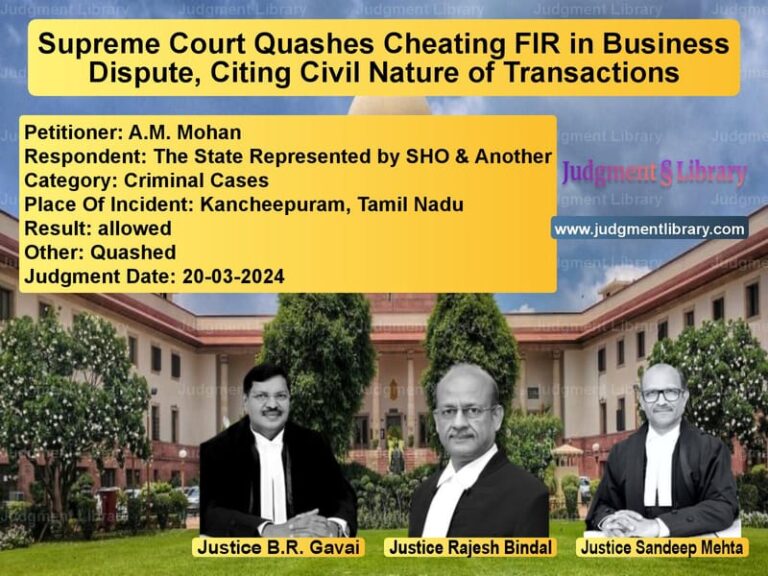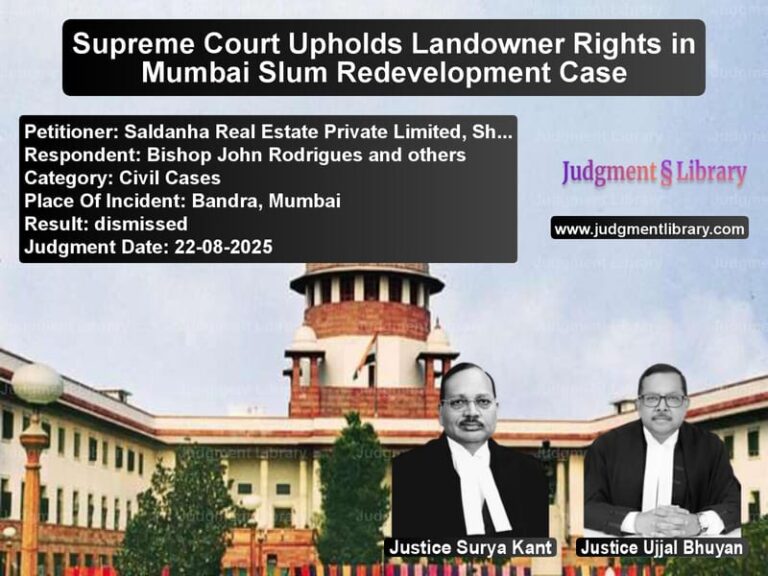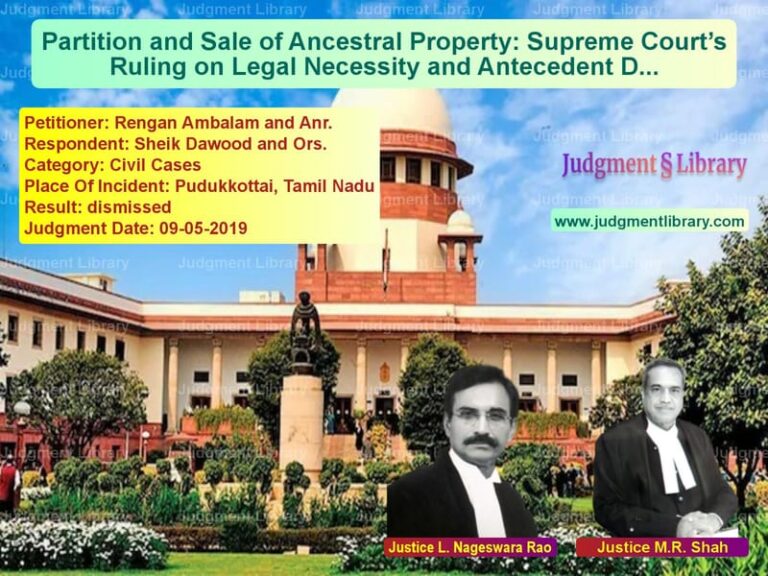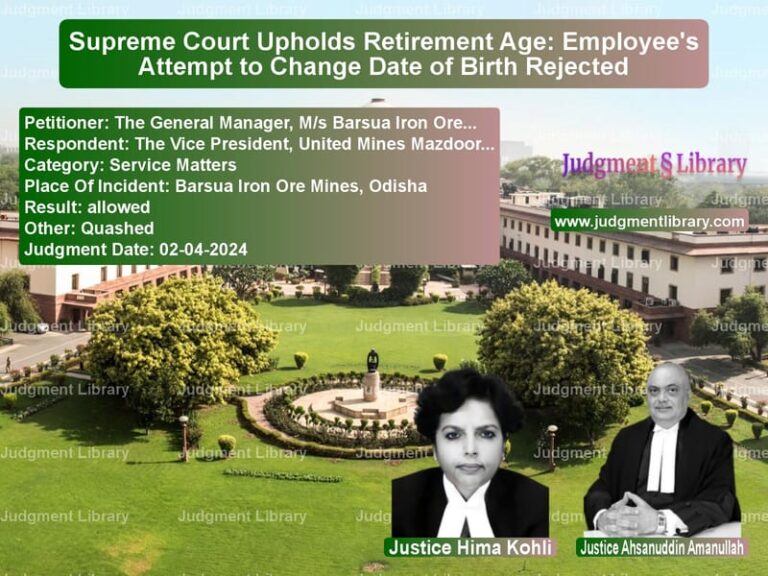Kerala Land Dispute: Supreme Court Rules on Private Forest Vesting
The case of State of Kerala vs. Mohammed Basheer revolves around the dispute over the ownership of land claimed by the respondent, which the Kerala government contended was private forest vested in the state under the Kerala Private Forests (Vesting and Assignment) Act, 1971 (KPF Act). The Supreme Court examined whether the respondent’s land was exempted from government control due to agricultural use and possession under the Kerala Land Reforms Act, 1963.
Background of the Case
The respondent, Mohammed Basheer, filed a petition before the Forest Tribunal, Palakkad, claiming that the land in question—about two acres in Muppenad (now Vellar Mala village), Vythiri Taluk, Wayanad district—was cultivated with coffee before the appointed day and was thus not subject to vesting under Section 3 of the KPF Act.
He supported his claim with a purchase certificate issued under the Kerala Land Reforms Act, arguing that he had inherited the land from his father, who had taken possession in 1962. He contended that he was a cultivating tenant and that forest officials unlawfully destroyed his crops in 1987.
The state government, in contrast, claimed that the land was never cultivated and was private forest vested in the state under the KPF Act in 1971. The Forest Tribunal dismissed the petition, but the Kerala High Court ruled in favor of Basheer, setting aside the tribunal’s order. The state of Kerala then appealed to the Supreme Court.
Petitioner’s Arguments (State of Kerala)
- The state argued that the land was forest land at the time of vesting and was not under cultivation.
- The purchase certificate issued under the Land Reforms Act did not conclusively establish ownership or possession.
- The Forest Tribunal had correctly ruled that the land was vested in the state, and the High Court erred in reversing this decision.
- Revenue receipts presented by the respondent did not prove his possession or title over the land.
Respondent’s Arguments (Mohammed Basheer)
- His father had leased the land in 1962 and had been cultivating coffee since 1969.
- The Land Tribunal had issued a purchase certificate under Section 72K of the Kerala Land Reforms Act, which was conclusive proof of his ownership.
- The land was not private forest as defined under the KPF Act but agricultural land exempted from vesting.
- The destruction of his crops by forest officials in 1987 was illegal.
Supreme Court’s Judgment
The Supreme Court, in a judgment delivered by Justices S. Abdul Nazeer and Deepak Gupta, upheld the High Court’s ruling in favor of the respondent. The key findings were:
- Conclusive Proof of Ownership: The purchase certificate issued under Section 72K of the Land Reforms Act was conclusive proof of ownership and possession.
- Exemption from Vesting: The land was under personal cultivation and within the ceiling limits prescribed under the Kerala Land Reforms Act, making it exempt under Section 3(2) of the KPF Act.
- Burden of Proof: The state failed to prove that the land was forest at the time of vesting.
- Forest Tribunal’s Error: The tribunal overlooked key evidence, including the purchase certificate.
Observations from the Judgment
The Court observed:
“The certificate of purchase issued under Section 72K(2) of the Kerala Land Reforms Act is conclusive proof of assignment of the right, title, and interest of the landowner. The respondent has established that he is the owner and in possession of the land on the appointed day.”
The Court also cited Cheeranthoodika Ahmmedkutty v. Parambur Mariakutty Umma (2000) to reaffirm that statutory conclusive proof bars contradiction through other evidence.
Conclusion
This ruling reinforces that land classified as agricultural and under personal cultivation before the appointed day is exempt from vesting under the KPF Act. It also highlights the importance of the Land Reforms Act in protecting tenants’ rights. The judgment ensures that individuals with legitimate ownership under the Land Reforms Act cannot be arbitrarily deprived of their property.
Petitioner Name: State of Kerala.Respondent Name: Mohammed Basheer.Judgment By: Justice S. Abdul Nazeer, Justice Deepak Gupta.Place Of Incident: Wayanad, Kerala.Judgment Date: 22-01-2019.
Don’t miss out on the full details! Download the complete judgment in PDF format below and gain valuable insights instantly!
Download Judgment: State of Kerala vs Mohammed Basheer Supreme Court of India Judgment Dated 22-01-2019.pdf
Direct Downlaod Judgment: Direct downlaod this Judgment
See all petitions in Property Disputes
See all petitions in Landlord-Tenant Disputes
See all petitions in Judgment by S. Abdul Nazeer
See all petitions in Judgment by Deepak Gupta
See all petitions in dismissed
See all petitions in supreme court of India judgments January 2019
See all petitions in 2019 judgments
See all posts in Civil Cases Category
See all allowed petitions in Civil Cases Category
See all Dismissed petitions in Civil Cases Category
See all partially allowed petitions in Civil Cases Category







